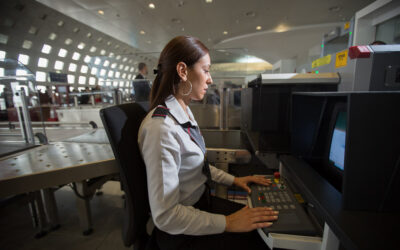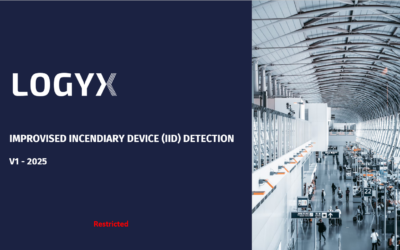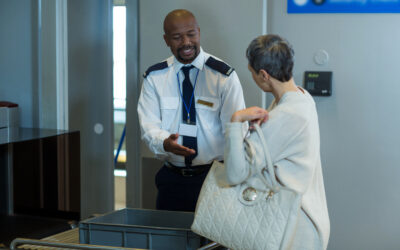Strayer Elene, Head of Program – Psychologist
LOGYX
Tournefeuille, France
April 2024
Abstract:
In an era of increasing international mobility and evolving security threats, French airport security has become a major concern, especially with the upcoming 2024 Paris Olympics. This article highlights the importance of diversifying the profiles of security agents to meet contemporary challenges while maintaining stringent security standards. It also explores the need for comprehensive psychological evaluations in the recruitment process, ensuring that agents possess not only the required technical skills but also the indispensable ethical and professional qualities to face the complex challenges of airport security. By adopting a holistic approach to recruitment and training, industry players can ensure their teams are competent and fully committed to protecting and securing all users of airport facilities.
Keywords: Airport Security; Recruitment; Professional Ethics; Profile Diversification; Risk Management
Challenges of Airport Security in a Globalized Context:
In a world where international mobility and security threats are rapidly evolving, airport security emerges as a strategic global issue. The approach to the 2024 Olympics puts France in the spotlight, accentuating the need to adapt recruitment and surveillance practices to ensure the safety of airport infrastructure and public spaces. Integrating diverse profiles, including students, retirees, and international forces, enriches the sector with a variety of skills while raising questions of compliance with safety standards (Diard & Vernet, 2020).
However, a fundamental question arises: How can we ensure the security of airport infrastructure in a context of increasing mobility and diversification of risks? In this article, we delve into this crucial issue, exploring the challenges faced by the airport security sector and the innovative solutions on the horizon.
Indeed, there is an urgency to diversify the profiles of security agents to better respond to contemporary challenges while ensuring rigorous security standards. Furthermore, we will deeply analyze the need to integrate comprehensive psychological evaluations in the recruitment process, ensuring that agents deployed in high-risk environments possess not only the required technical skills but also the indispensable ethical and professional qualities to face the complex challenges of airport security. Our goal is to highlight the crucial role of personality assessment in strengthening security processes. By adopting a holistic approach to recruitment and training, industry players can guarantee not only the competence of their teams but also their full commitment to the protection and security of all users of airport infrastructure.
Diversity and Challenge: Adapting to the New Face of Security Agents:
Following its principles, the EU, in agreement with ICAO recommendations, prescribes a recruitment approach for security agents that includes thorough assessments of physical and mental abilities. This regulation, sometimes misunderstood, goes beyond evaluating the cognitive and visual characteristics of candidates, also considering their ethical qualities and integrity. These requirements reflect an awareness of the complexity of security threats and the necessity for increased rigor in recruiting security agents, where operational competence must be combined with a careful evaluation of ethical principles and moral judgment.
In this sense, it’s no longer just the ability to perform specific tasks that is scrutinized, but also the capacity of each individual to make responsible and ethical decisions in unpredictable situations. Cybercrime and recent infiltrations of organized crime in some airports, like those at Saint-Thomas Airport in the Virgin Islands exploiting post-Covid mass recruitment, reveal gaps in traditional recruitment and training methods, emphasizing the importance of innovative recruitment protocols. These protocols must not only confirm backgrounds and qualifications but also reveal character traits that predict adherence to the ethical principles of the profession and the level of responsibility expected in their future role.
To meet these challenges, the implementation of holistic recruitment processes and enriched training programs is essential. These programs must emphasize psychological resilience, clear communication, and ethical judgment, ensuring that security agents can effectively respond to a wide range of threats. Airport security is not measured solely by technical risk management but by the quality and integrity of those responsible for maintaining it. It’s evident that airport security must rethink its approach to recruitment. The importance of selecting candidates who possess not only operational skills but also adaptability, agility, and enhanced communication abilities is crucial. In light of this reality, the sector must now seek a balance between technical expertise and a deeper understanding of the psychology and behavioral skills that define performance in security roles and the safeguarding of national space.
Recruitment Criteria: Balancing Skills and Psychology:
In the post-pandemic era, the trend in airport security recruitment leans towards a comprehensive appreciation of candidates, where professional ethics and moral integrity are prioritized as much as technical skills and soft skills. Failoni & Dane’s (2023) study highlights the sector’s leaders recognizing the importance of fostering an ethical work environment where resilience and emotional intelligence are valued as much as technical ability. Therefore, recruitment protocols must be meticulously designed to examine candidates in all respects – assessing their adherence to the ethical standards of the sector, their moral sense in carrying out their tasks, and their commitment to the deontological principles governing their profession, in addition to the physical and mental aptitudes indispensable for the role. Interviews, situational tests, and evaluations must seek to detect not only competence and aptitude but also a deep integration of values that support a reliable and responsible safety culture.
This enriched approach underscores the importance of training agents who are not only technically competent and personally resilient but are also guided by an unwavering ethical compass. These professionals will carry the mission of safety into the future, ensuring security based not only on protocols but also on a commitment to moral principles that strengthen trust and safety for all.
Références
Diard, É., & Vernet, H. (2020). Radicalisation au cœur des services publics : Sport, hôpitaux, transports…: ce qu’on ne vous dit pas (Première édition). JC Lattès.
Failoni, D., & Dane, M.-J. (2023, mars 8). The shifting skillset of the post-pandemic airport workforce. International Airport Review. https://www.internationalairportreview.com/article/183138/the-shifting-skillset-of-the-post-pandemic-airport-workforce/



